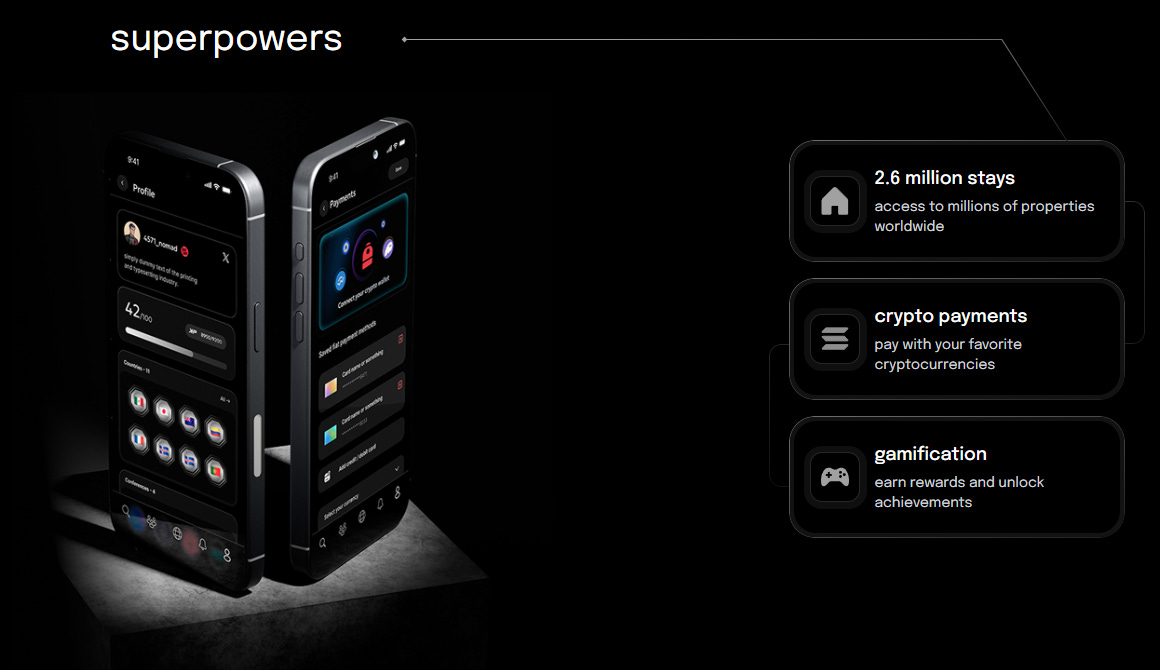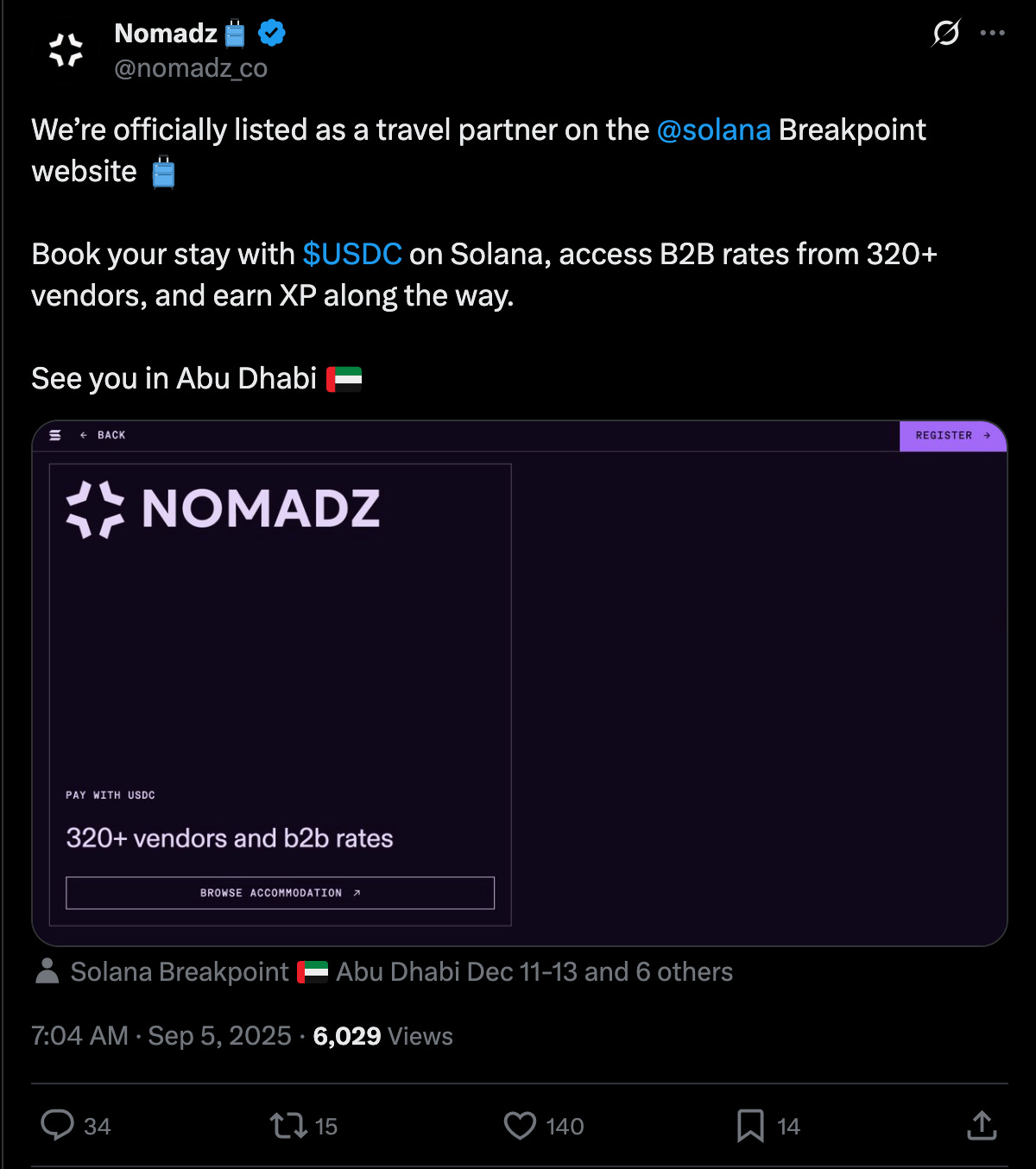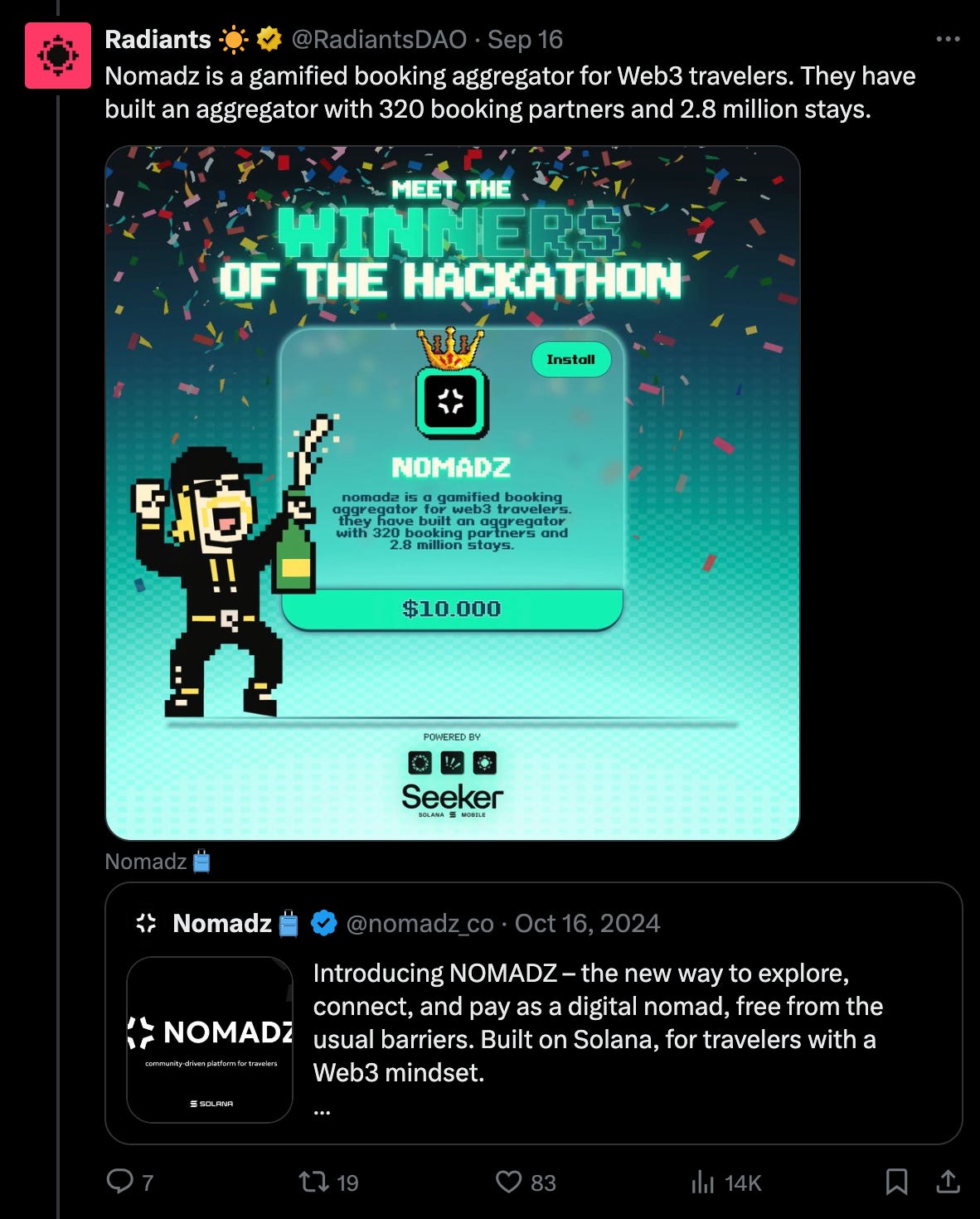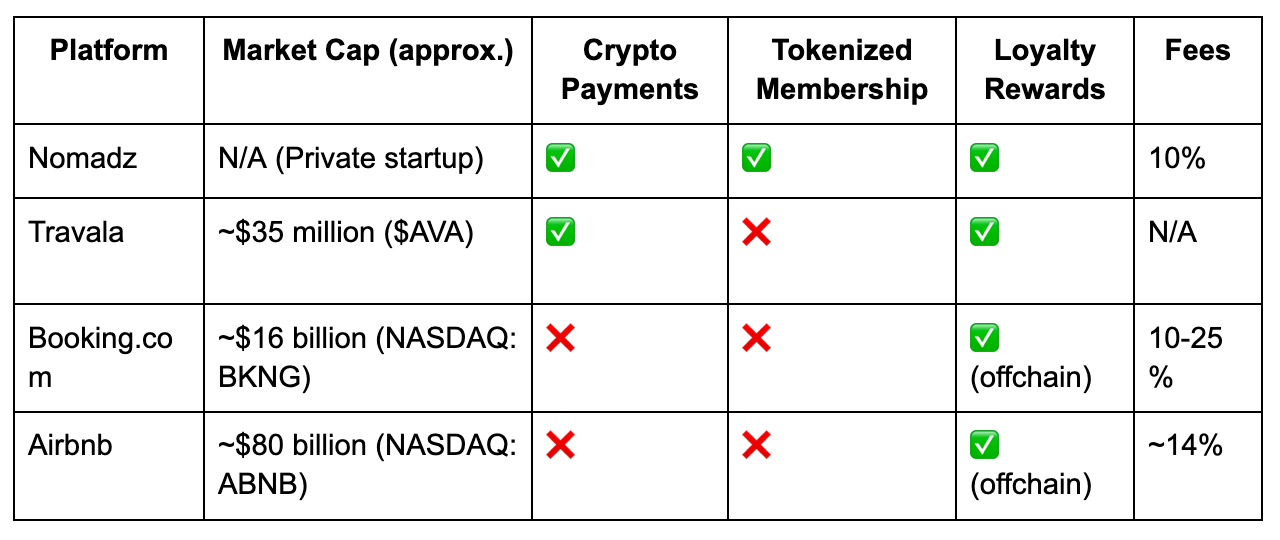Introducing Nomadz: Building the Future of Travel on Solana
As part of our work funding builders through the Metaplex Grants Program, IslandDAO is proud to spotlight Nomadz, a team redefining travel on Solana.
Nomadz is a booking aggregator that allows users to choose from over 2.8 million accommodations and pay in USDC on Solana. New users can mint a tokenized “Nomad ID”, which unlocks onchain rewards like XP, lootboxes, discounts, and access to exclusive events.
In January 2025, the Nomadz team received a grant from the Metaplex Grants Program (managed by IslandDAO) to develop Nomad IDs using Metaplex’s CORE NFT standard.
The platform has already attracted 10,000+ registered users and is generating revenue. In September 2025, Nomadz will launch Season 1 with 5x boosted rewards to further drive adoption and engagement.
In addition to support from the Metaplex Grants Program, Nomadz has also secured funding from the Solana Foundation, Kumeka Team, and Superteam, and is a member of the Circle Alliance.
The problem
Travel platforms like Booking.com and Trivago charge high service fees, often 15% - 30% per booking. In addition, they don’t support cryptocurrency payments and offer limited loyalty benefits.
Meanwhile, crypto adoption has grown to more than 560 million users worldwide in 2024. Stablecoins alone now represent a $270–$300 billion market, with USDT and USDC accounting for the majority. There are also more than 40 million digital nomads globally, with 17.3 million in the United States alone.
The gap is clear. Travelers face high fees and weak incentives, while a growing base of crypto users is looking for real-world ways to spend. A platform that accepts stablecoins (& bluechips) and offers stronger rewards is well positioned to meet this demand.
Nomadz approach
Nomadz aggregates millions of bookings from 320+ global travel providers. Bookings are processed with a flat 10% fee and support USDC on Solana Through its integration with Backpack Exchange, users also benefit from 0% off-ramp fees.
When users sign up, they can mint a Nomad ID (a tokenized membership) that tracks onchain XP, referrals, and travel activity. This forms the foundation for Nomadz’s user engagement and retention, which includes:
Gamification engine: Achievements stored onchain feed into dynamic leaderboards. Users can earn XP to unlock benefits like discounts, travel perks, NFT rewards and event tickets.
Social network: Travelers can connect with others in their community based on shared achievements or event participation, making it easier to plan trips together.
Referral system: Growth is driven by a transparent, onchain referral system. Each referral is recorded via smart contracts, making it easy to trace and reward interactions.
By combining the core utility of legacy online travel agencies (OTAs) with a crypto-native identity layer, Nomadz enables composable, reputation-based travel experiences.
Team Background
Nomadz was founded in 2024 under the name Rent Space and later rebranded during the Founders Villa event hosted by Superteam UAE. The project gained early recognition by winning 3rd place in the Kumeka Team track at the Radar Solana Hackathon in November 2024.
Ivan Maltsev, the Chief Executive Officer (CEO), holds leadership roles in Venture Launch – an accelerator early-stage fundraising for Solana startups. He is also a General Partner at 3x Capital, an investment firm focused on accelerating Solana-based ventures.
In 2025, Ivan co-organized Solana Temple - a wellness and leadership retreat designed for founders and investors seeking sustainable, mindful growth in crypto, supported by the Solana Foundation.
Vlad Poltavtsev, Chief Operating Officer (COO), holds a PhD in Marketing and has over seven years of experience in the real estate industry. Vlad brings expertise in operations and customer-facing services, giving Nomadz an edge in execution within the hospitality and travel space.
Lina Ilashchuk, the Chief Marketing Officer (CMO), is responsible for audience growth and brand strategy. She has helped Nomadz grow its Twitter following to over 16,500, building early community traction ahead of the platform’s public launch.
Petro Yaremenko, the Technical Lead, brings over five years of experience in building blockchain-based solutions. Currently, he oversees the platform’s development and leads a small internal team comprising a product manager, 2 developers and a designer. Petro’s focus has recently expanded to include integrating CORE technology into the product’s gamified reward system.
Beeman, the Technical Advisor, is a software engineer and Open Source evangelist with over 25 years of experience. He has been developing in the Solana ecosystem since 2021 and is a member of the Metaplex grants council. His focus area is developer tooling and mentoring teams. He has been a digital nomad for over 10 years.
Go-to-Market & Traction
Nomadz launched its beta at the Solana Crossroads event in April 2025, where the team onboarded more than 200 early users and introduced the Nomad ID as a tokenized travel membership. By the end of Q2 2025, roughly 670 users had minted Nomad IDs, generating early onchain activity and fees for the Metaplex DAO.
To date, Nomadz has surpassed 10,000 unique user profiles and grown its community to 16,500+ followers on X. This traction is supported by recognition in the broader Solana ecosystem, including being listed as a travel partner on the Solana Breakpoint website.
Nomadz generates revenue through a 10% booking commission and has expanded into Web3-native monetization with NFT sales, badge royalties, affiliate partnerships, and event-driven activations.
Since launch, the team has shipped core features like the referral system, dynamic XP and achievements, and multi-room booking. They have also piloted new verticals such as Solana Sailing, an IRL networking event hosted aboard a boat that drew over 100 applications. Most recently, Nomadz won $10,000 in the Solana Mobile Hackathon (by RadiantsDAO) for refining the platform into a mobile-first Solana dApp.
Looking ahead, Nomadz has secured active partnerships with Kumeka Team, IslandDAO, and La Familia, creating opportunities for joint events, affiliate revenue, and NFT-driven activations. In September 2025, the platform will roll out Season 1 of XP Farming, introducing seasonal loot boxes and gamified incentives to boost retention and engagement.
Market & Sector Outlook
The travel booking services industry has a total addressable market of $566.7 billion. While crypto adoption in this space is still in its early stages, it's showing strong signs of acceleration. In 2024:
The global online travel booking market was valued at USD 566.7 billion in 2024, with projected growth at ~9.85% CAGR through 2033.
Crypto adoption in travel is accelerating: 78% of Travala bookings in 2024 were paid with cryptocurrencies.
These trends suggest that Web3-native travel products are entering a growth phase.
Competitors
Major platforms, such as Booking.com and Airbnb, lead the market. These platforms primarily operate using fiat currency with fee structures ranging from 10% to 25%.
In contrast, emerging platforms are integrating crypto payments to innovate the travel booking experience. Below is a comparison of leading platforms in both traditional and crypto-focused travel:
Among crypto-focused online travel agencies (OTAs), Travala.com is the most established competitor. Travala supports over 100 cryptocurrencies for bookings and has introduced a loyalty system called the Smart Program, which offers tiered benefits based on locked token holdings. As of May 2025, there are 65.8k Smart Program members (~6x more than Nomadz’s 10.9k users as of May 2025).
While Travala offers higher rewards to premium users who lock AVA tokens, Nomadz delivers more accessible benefits with no staking requirements, lowering the barrier to participation.
Additionally, Travala’s platform has limited emphasis on social identity, travel history, or community interaction. Nomadz, by contrast, integrates a gamified social layer that tracks travel, and referrals, and connects travellers.
Risks
The travel industry is crowded and competitive, with thin margins. Lower booking fees are attractive, but not unique. Nomadz must stand out through user experience, partnerships, and rewards.
Key risks include:
Network effects: The value of onchain identity, referrals, and gamification grows with user activity, but requires scale to deliver real impact.
Web2–Web3 UX gap: Wallet setup, token minting, and onchain actions can create friction for mainstream travelers used to seamless platforms.
Platform dependency: Reliance on exchanges and booking aggregators means API changes or partner exits could disrupt operations.
Closing Thoughts
Nomadz’s development roadmap is set to accelerate user growth and platform adoption in the coming months.
The team is working to enable payments with tokens like SOL and BONK, expanding beyond USDC. Increased integration with in-person Solana events will further drive momentum. As events like Solana Sailing and Tour de Sol gain traction, Nomadz is positioning itself as the premier travel and experience platform for Web3-native gatherings.
Beyond bookings, Nomadz is developing a social layer designed to connect crypto-native travelers through shared activity, reputation, and events.
After being featured as a Breakpoint travel partner, the team is now preparing for Season 1 of its XP campaign, designed to attract new users while rewarding the existing community in more meaningful ways.










